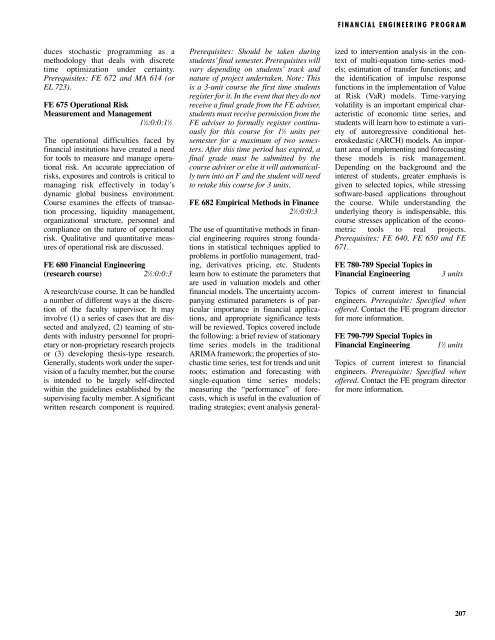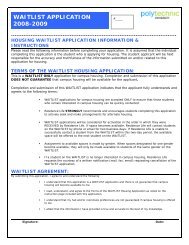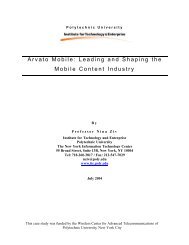POLYTECHNIC UNIVERSITY 2005-2007
POLYTECHNIC UNIVERSITY 2005-2007
POLYTECHNIC UNIVERSITY 2005-2007
Create successful ePaper yourself
Turn your PDF publications into a flip-book with our unique Google optimized e-Paper software.
FINANCIAL ENGINEERING PROGRAM<br />
duces stochastic programming as a<br />
methodology that deals with discrete<br />
time optimization under certainty.<br />
Prerequisites: FE 672 and MA 614 (or<br />
EL 723).<br />
FE 675 Operational Risk<br />
Measurement and Management<br />
1 1 ⁄4:0:0:1 1 ⁄2<br />
The operational difficulties faced by<br />
financial institutions have created a need<br />
for tools to measure and manage operational<br />
risk. An accurate appreciation of<br />
risks, exposures and controls is critical to<br />
managing risk effectively in today’s<br />
dynamic global business environment.<br />
Course examines the effects of transaction<br />
processing, liquidity management,<br />
organizational structure, personnel and<br />
compliance on the nature of operational<br />
risk. Qualitative and quantitative measures<br />
of operational risk are discussed.<br />
FE 680 Financial Engineering<br />
(research course) 2 1 ⁄2:0:0:3<br />
A research/case course. It can be handled<br />
a number of different ways at the discretion<br />
of the faculty supervisor. It may<br />
involve (1) a series of cases that are dissected<br />
and analyzed, (2) teaming of students<br />
with industry personnel for proprietary<br />
or non-proprietary research projects<br />
or (3) developing thesis-type research.<br />
Generally, students work under the supervision<br />
of a faculty member, but the course<br />
is intended to be largely self-directed<br />
within the guidelines established by the<br />
supervising faculty member. A significant<br />
written research component is required.<br />
Prerequisites: Should be taken during<br />
students’final semester. Prerequisites will<br />
vary depending on students’ track and<br />
nature of project undertaken. Note: This<br />
is a 3-unit course the first time students<br />
register for it. In the event that they do not<br />
receive a final grade from the FE adviser,<br />
students must receive permission from the<br />
FE adviser to formally register continuously<br />
for this course for 1 1 ⁄2 units per<br />
semester for a maximum of two semesters.<br />
After this time period has expired, a<br />
final grade must be submitted by the<br />
course adviser or else it will automatically<br />
turn into an F and the student will need<br />
to retake this course for 3 units.<br />
FE 682 Empirical Methods in Finance<br />
2 1 ⁄2:0:0:3<br />
The use of quantitative methods in financial<br />
engineering requires strong foundations<br />
in statistical techniques applied to<br />
problems in portfolio management, trading,<br />
derivatives pricing, etc. Students<br />
learn how to estimate the parameters that<br />
are used in valuation models and other<br />
financial models. The uncertainty accompanying<br />
estimated parameters is of particular<br />
importance in financial applications,<br />
and appropriate significance tests<br />
will be reviewed. Topics covered include<br />
the following: a brief review of stationary<br />
time series models in the traditional<br />
ARIMA framework; the properties of stochastic<br />
time series, test for trends and unit<br />
roots; estimation and forecasting with<br />
single-equation time series models;<br />
measuring the “performance” of forecasts,<br />
which is useful in the evaluation of<br />
trading strategies; event analysis generalized<br />
to intervention analysis in the context<br />
of multi-equation time-series models;<br />
estimation of transfer functions; and<br />
the identification of impulse response<br />
functions in the implementation of Value<br />
at Risk (VaR) models. Time-varying<br />
volatility is an important empirical characteristic<br />
of economic time series, and<br />
students will learn how to estimate a variety<br />
of autoregressive conditional heteroskedastic<br />
(ARCH) models. An important<br />
area of implementing and forecasting<br />
these models is risk management.<br />
Depending on the background and the<br />
interest of students, greater emphasis is<br />
given to selected topics, while stressing<br />
software-based applications throughout<br />
the course. While understanding the<br />
underlying theory is indispensable, this<br />
course stresses application of the econometric<br />
tools to real projects.<br />
Prerequisites: FE 640, FE 650 and FE<br />
671.<br />
FE 780-789 Special Topics in<br />
Financial Engineering<br />
3 units<br />
Topics of current interest to financial<br />
engineers. Prerequisite: Specified when<br />
offered. Contact the FE program director<br />
for more information.<br />
FE 790-799 Special Topics in<br />
Financial Engineering<br />
1 1 ⁄2 units<br />
Topics of current interest to financial<br />
engineers. Prerequisite: Specified when<br />
offered. Contact the FE program director<br />
for more information.<br />
207




